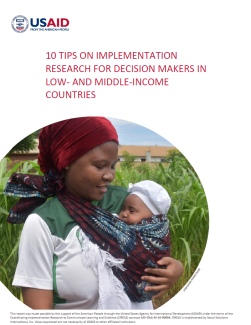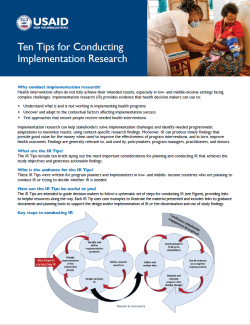Why conduct implementation research?
Health interventions often do not fully achieve their intended results, especially in low- and middle-income settings facing complex challenges. Implementation research (IR) provides evidence that health decision makers can use to:
- Understand what is and is not working in implementing health programs
- Uncover and adapt to the contextual factors affecting implementation success
- Test approaches that ensure people receive needed health interventions
Implementation research can help stakeholders solve implementation challenges and identify needed programmatic adaptations to maximize results, using context-specific research findings. Moreover, IR can produce timely findings that provide good value for the money when used to improve the effectiveness of program interventions, and in turn, improve health outcomes. Findings are generally relevant to, and used by, policymakers, program managers, practitioners, and donors.


